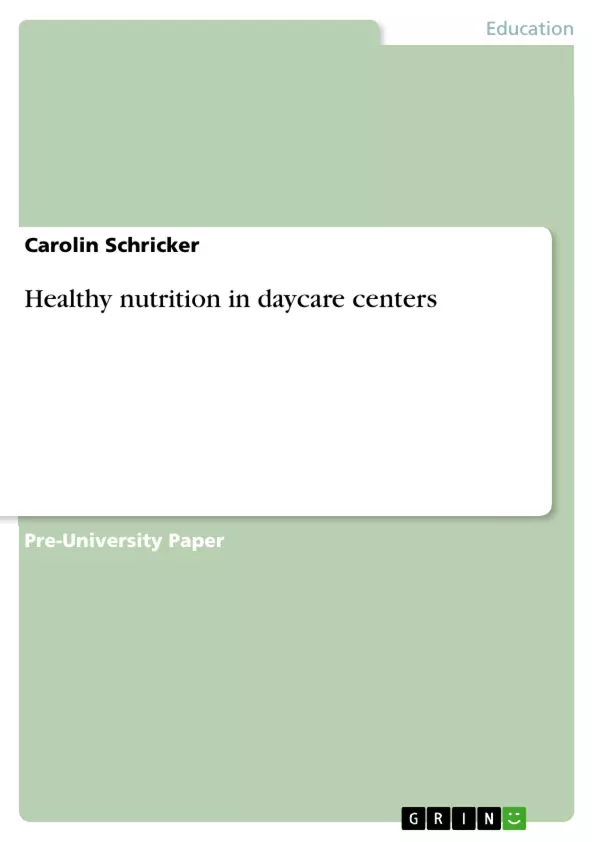Every year the number of overweight children in the preschool examinations increases. Being overweight or even obese at a young age is usually followed by a series of diseases (delayed puberty, type 2 diabetes mellitus, high blood pressure and so on) in adulthood at the latest. This work deals with educational offers that introduce children to the topic of "healthy nutrition" and give them plenty of opportunity to promote their basic skills.
Inhaltsverzeichnis (Table of Contents)
- A look at health - reasons for a healthy diet in childhood.
- Healthy nutrition in daycare centers – possibilities and opportunities
- How to promote health awareness among children regarding a healthy diet in day-care centres
- Healthy breakfast
- Educational partnership
- Nutrition education
- Promoting resilience
- Possible consequences for the development of a child due to unhealthy diet
- Consequences of malnutrition
- Consequences of overeating
- Practical implementation of a healthy diet for children in a day care center
- Joint purchase of food.
- Baking a bread.
- Self-catering in day-care centres.
- Healthy breakfast – getting to know new foods.
- Parental work
- Participation for the quality of health education
- Summary
Zielsetzung und Themenschwerpunkte (Objectives and Key Themes)
This work aims to explore the significance of healthy nutrition in daycare centers for the development of children. It emphasizes the importance of fostering healthy eating habits and promoting health awareness in early childhood. Key themes addressed in the text include:- The crucial role of early childhood education in shaping healthy lifestyle habits.
- The impact of unhealthy dietary practices on the physical and mental well-being of children.
- The potential of daycare centers to implement practical strategies for promoting healthy nutrition among children.
- The benefits of collaborative efforts between daycare centers, parents, and educators in promoting health awareness.
- The diverse approaches to healthy meal preparation and catering in daycare centers.
Zusammenfassung der Kapitel (Chapter Summaries)
- Chapter 1: This chapter establishes the importance of healthy eating habits in early childhood, highlighting the lasting impact of these habits on individuals' health and well-being. It discusses the increasing prevalence of childhood obesity and related health problems such as diabetes mellitus type 2, and emphasizes the role of health education in promoting healthy lifestyles.
- Chapter 2: This chapter explores the possibilities and opportunities for implementing healthy nutrition practices in daycare centers. It examines various approaches to food preparation, including cook-and-hold, cook-and-serve, cook-and-freeze, and cook-and-chill methods, and analyzes the advantages and disadvantages of each method. The importance of involving children in meal preparation, menu planning, and table decoration is discussed, as well as the significance of creating a positive and supportive eating environment.
- Chapter 3: This chapter focuses on practical strategies for promoting health awareness among children in daycare centers. It discusses the importance of a healthy breakfast, educational partnerships between parents and educators, nutrition education programs, and activities aimed at promoting resilience. The chapter underscores the benefits of incorporating healthy eating into daily routines and creating a culture of health awareness in the daycare environment.
- Chapter 4: This chapter explores the potential consequences of an unhealthy diet for the development of a child. It discusses the detrimental effects of malnutrition, such as stunted growth, cognitive delays, and impaired immune function. The chapter also discusses the negative impact of overeating on health and well-being, including the risks of obesity, type 2 diabetes, and cardiovascular disease.
- Chapter 5: This chapter provides practical recommendations for implementing healthy eating practices in daycare centers. It discusses strategies such as joint food purchases, baking activities, self-catering, and the introduction of new foods through healthy breakfast programs. The chapter also emphasizes the importance of parental involvement and the role of participatory decision-making in promoting quality health education.
Schlüsselwörter (Keywords)
This work centers on the crucial topic of healthy nutrition in early childhood, specifically within the context of daycare centers. It examines the connection between diet and children's physical and mental development, emphasizing the importance of establishing healthy eating habits early on. The text explores practical strategies for implementing health-promoting measures in daycare settings, highlighting the role of educators, parents, and children in fostering a culture of health awareness and responsible food choices. Key terms and concepts explored in the text include childhood obesity, health education, nutrition awareness, dietary practices, food preparation, meal planning, and the importance of creating a supportive eating environment.Frequently Asked Questions
Why is healthy nutrition important in daycare centers?
Early childhood is a critical period for shaping lifelong habits. Healthy nutrition in daycare helps prevent obesity and related diseases like type 2 diabetes later in life.
What are the consequences of an unhealthy diet for children?
Unhealthy diets can lead to malnutrition (stunted growth, cognitive delays) or overeating (obesity, high blood pressure, and delayed puberty).
How can daycare centers promote health awareness?
Through nutrition education, involving children in meal preparation (like baking bread), and establishing educational partnerships with parents.
What roles do parents play in healthy nutrition at daycare?
Parental involvement is crucial for consistency between home and daycare, ensuring that healthy eating habits are reinforced in both environments.
What are practical ways to teach children about food?
Practical activities include joint food purchases, gardening, cooking together, and introducing new foods during a healthy breakfast program.
- Citation du texte
- Carolin Schricker (Auteur), 2018, Healthy nutrition in daycare centers, Munich, GRIN Verlag, https://www.grin.com/document/1185766



